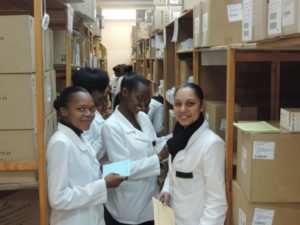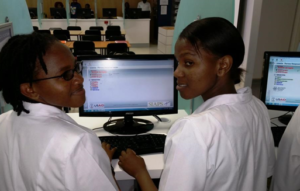By Bright Phiri, SIAPS Communications Officer; Katelyn Payne, SIAPS Project Associate; and Susan Putter, SIAPS Principal Technical Advisor
A serious deficit of pharmacy support personnel in South Africa has highlighted the need to create new career opportunities in the field of pharmaceutical services provision. According to the South African Pharmacy Council, there are approximately 14,213 registered professionals specializing in the provision of pharmacy services. With a population of 52.98 million, the country needs to both increase the number of trained pharmacy personnel and heighten the quality of service delivery nationwide.
Due to the burden of disease and the substantial volume of patients accessing antiretroviral (ARV) and TB medicines in South Africa, cadres of highly qualified pharmacy support personnel at primary health care clinics are necessary to lessen the burden on regional and facility-level pharmacists. The South African Pharmacy Council introduced two new mid-level categories of pharmacy support personnel nationwide: pharmacy technical assistants (PTAs) and pharmacy technicians (PTs). To register as PTAs or PTs with the South African Pharmacy Council, students must complete a rigorous one- or two-year training program in a registered university training program. In February 2013, Nelson Mandela Metropolitan University (NMMU) in the Eastern Cape became the first university in South Africa to offer training for students interested in pursuing careers as PTAs and PTs, enrolling 59 students during the program’s first year of implementation.
One of the key responsibilities of these new cadres of pharmacy personnel is to manage medicine inventory in hospitals, community health centers and clinics. In 2013, the USAID-funded Systems for Improved Access to Pharmaceuticals and Services (SIAPS) assisted NMMU in developing a medicine supply management module for integration into the university’s PTA curriculum. Once the module was finalized, SIAPS directly facilitated the lectures on medicine supply management, including teaching students how to use stock cards for proper stock management.

Providing classroom instruction on medicine supply management was only one aspect of SIAPS’ contribution to educating NMMU students on proper stock management. In October 2013, SIAPS coordinated an on-site field visit to Dora Nginza Hospital’s pharmacy for current PTA students. Students had the opportunity to gain real-world experience by assessing the storage and maintenance of medicines, analyzing stock cards and calculating appropriate stock levels given the pharmacy’s product usage. The on-site training allowed students to relate theoretical pharmaceutical concepts discussed in the classroom to the practical domain of an operational hospital pharmacy.
“I have never been to a hospital pharmacy before,” said Ncebakazi Mhlontlo, a PTA student at NMMU. “They showed us their storage area, refrigerator for thermolabile medicines, and dispensing area.”
In 2014, 52 PTA students from the previous year began their second year of study in pursuit of certification as PTs. The students completed a stock management module developed by SIAPS that incorporated training on RxSolution, an electronic pharmaceutical management information system (PMIS) for managing inventory and dispensing medicines to patients, which is widely used in public healthcare facilities in South Africa. To facilitate hands-on training on RxSolution, SIAPS installed the software on 30 computers in the university’s model pharmacy.
To ensure NMMU’s continued use of the SIAPS-developed modules and training materials, SIAPS facilitated a training-of-the-trainer session on RxSolution for four lecturers at NMMU. The lecturers have since taken over the instruction of the medicine supply management and stock management modules. Although the responsibility for teaching medicine supply management had transitioned to NMMU lecturers, SIAPS remained involved in the training of new PTA students by facilitating the program’s annual visit to Dora Nginza Hospital in October 2014.

More than 76 students have now been exposed to RxSolution through lectures and training exercises at NMMU. As the province expands its use of RxSolution, PTAs and PTs will already have the versatile skills required to manage RxSolution, as well as paper-based stock cards. The training of these students on the use of RxSolution will assist in improving service delivery and records management nationwide.
In November 2014, 52 students—more than 75% of whom were women—graduated from NMMU’s PTA program. These graduates will be of great assistance to the 1,655 pharmacists already practicing in the Eastern Cape and throughout all of South Africa. Pre-service instruction in medicine supply and stock management encourages future support staff to develop a greater awareness of how pharmacies should operate to optimize medicine availability and rational medicine use. SIAPS will continue to work with NMMU to support new career opportunities for young people interested in the pharmacy profession.

